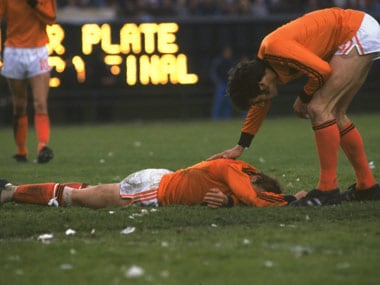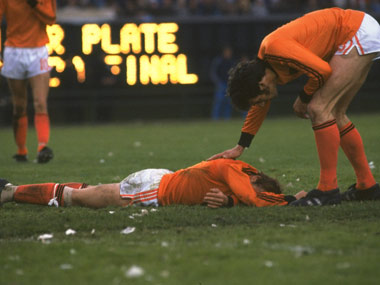This FIFA World Cup History feature is part of our build-up to the 2014 edition, which will chart the most special moments from previous tournaments. Today we have a look at the 1978 World Cup.
Click here for the full series
. The world’s romance with Dutch football did not end after World Cup 1974 — there was simply a four-year break and it rekindled in 1978 — and once again it was extinguished in controversial fashion. The mood surrounding the 1978 World Cup was probably similar to what you see in Brazil right now. But the reasons were completely different — Brazilians are upset their government has decided to spend billions to stage the World Cup and Olympics when that money could have gone into improving the lot of the people. In Argentina the bloody military coup of 1976 still cast a shadow on the tournament and a number of teams debated whether or not they should take part. No countries eventually boycotted it, but Dutch great Johan Cruyff suggested that he would retire just before the tournament because he was against military dictatorship in the host country (he later changed his version, saying that his family were subject to a kidnap attempt in Barcelona a year before and that this had caused his retirement). Without Cruyff, the Dutch relied on the leadership of centre-back Ruud Krol, midfielders Arie Haan, Wim Jansen, the van de Kerkhof brothers and Johan Neeskens with Rob Rensenbrink and Johnny Rep leading the line. [caption id=“attachment_1516167” align=“alignleft” width=“380”]
 With three lost finals, the Dutch are World Cup history’s greatest nearly-men. Getty Images[/caption] Argentina were a strong side and clear favourites — their eccentric chain-smoking coach Cesar Luis Menotti could also afford to leave out wunderkind Diego Maradona from the final squad. Defender Daniel Passarella, playmaker Osvaldo Ardiles and strikers Mario Kempes and Leopoldo Luque were enough to win the cup. Goalkeeper Ubaldo Fillol wasn’t that bad too. But it wasn’t so easy for the hosts — they edged past France and Hungary 2-1 but failed against Italy who topped the group. The Netherlands were worse off — they came through the group stages only on goal difference, getting just three points after a draw against Peru, a shock loss to Scotland and a routine win over Iran. It’s quite stunning how two teams who had such a stuttering start to the World Cup reached the finals. In the second group stage, Netherlands had a chance to avenge their 1974 final loss when they came up against West Germany. They drew against them 2-2 in a result that eventually knocked the defending champs out of the title race and then won a brilliant match against Italy where Ernie Brandts first scored an own goal and then corrected his mistake before Haans’ 40-yard rocket sealed the match. All this while, something sinister was happening in the other group. In what perhaps goes down as one of the biggest World Cup controversies, Peru faced Argentina, who needed to win by at least four goals to go through to the finals. And guess what, Peru lost 0-6 and Argentina made the finals. There are various unproven theories which try and make sense of Peru’s capitulation. After all, Peru had conceded just six goals in their last five World Cup matches, so they weren’t that bad. The most popular theory is that the coach, some players or the whole team were bribed to lose by more than four goals. The next most popular rumour was spread by Brazil — it said that the Peruvian goalkeeper, born in Argentina, purposely under-performed. There were reports in the British media that said a large grain shipment and the unfreezing of a Peruvian band account in the Argentine Central Bank were part of the deal. There’s another theory which says Argentina’s military freed 13 Peruvians in exchange for the loss. In fact, Argentina striker Luque later said: ““In hindsight, we should never have played that World Cup. I strongly believe that.” While these are rumours, what happened before the final is reality. The Netherlands team bus was taken to the stadium through a long winding route and Argentina kept them waiting on the pitch for 10 minutes amid 70,000 raucous supporters. They then made a ruckus over a FIFA-cleared cast on Van de Kerkhof’s fractured wrist. Of the match itself, Kempes opened the scoring before Dirk Nanninga stayed true to his pre-match conference and headed the equaliser. Dutch striker Rensenbrink hit the post in the last minute and Argentina buried the Dutch in extra-time with Daniel Bertoni and Kempes goals. “If the trajectory of my shot had been five centimetres different, we would have been world champions,” Resenbrink said later. With three lost finals (including World Cup 2010), the Dutch are World Cup history’s greatest nearly-men. World Cup 1978 Hosts: Argentina Winners: Argentina (3-1 vs Netherlands) Top-scorer: Mario Kempes (6 goals) Follow the writer on Twitter
@TheFalseNo9
With three lost finals, the Dutch are World Cup history’s greatest nearly-men. Getty Images[/caption] Argentina were a strong side and clear favourites — their eccentric chain-smoking coach Cesar Luis Menotti could also afford to leave out wunderkind Diego Maradona from the final squad. Defender Daniel Passarella, playmaker Osvaldo Ardiles and strikers Mario Kempes and Leopoldo Luque were enough to win the cup. Goalkeeper Ubaldo Fillol wasn’t that bad too. But it wasn’t so easy for the hosts — they edged past France and Hungary 2-1 but failed against Italy who topped the group. The Netherlands were worse off — they came through the group stages only on goal difference, getting just three points after a draw against Peru, a shock loss to Scotland and a routine win over Iran. It’s quite stunning how two teams who had such a stuttering start to the World Cup reached the finals. In the second group stage, Netherlands had a chance to avenge their 1974 final loss when they came up against West Germany. They drew against them 2-2 in a result that eventually knocked the defending champs out of the title race and then won a brilliant match against Italy where Ernie Brandts first scored an own goal and then corrected his mistake before Haans’ 40-yard rocket sealed the match. All this while, something sinister was happening in the other group. In what perhaps goes down as one of the biggest World Cup controversies, Peru faced Argentina, who needed to win by at least four goals to go through to the finals. And guess what, Peru lost 0-6 and Argentina made the finals. There are various unproven theories which try and make sense of Peru’s capitulation. After all, Peru had conceded just six goals in their last five World Cup matches, so they weren’t that bad. The most popular theory is that the coach, some players or the whole team were bribed to lose by more than four goals. The next most popular rumour was spread by Brazil — it said that the Peruvian goalkeeper, born in Argentina, purposely under-performed. There were reports in the British media that said a large grain shipment and the unfreezing of a Peruvian band account in the Argentine Central Bank were part of the deal. There’s another theory which says Argentina’s military freed 13 Peruvians in exchange for the loss. In fact, Argentina striker Luque later said: ““In hindsight, we should never have played that World Cup. I strongly believe that.” While these are rumours, what happened before the final is reality. The Netherlands team bus was taken to the stadium through a long winding route and Argentina kept them waiting on the pitch for 10 minutes amid 70,000 raucous supporters. They then made a ruckus over a FIFA-cleared cast on Van de Kerkhof’s fractured wrist. Of the match itself, Kempes opened the scoring before Dirk Nanninga stayed true to his pre-match conference and headed the equaliser. Dutch striker Rensenbrink hit the post in the last minute and Argentina buried the Dutch in extra-time with Daniel Bertoni and Kempes goals. “If the trajectory of my shot had been five centimetres different, we would have been world champions,” Resenbrink said later. With three lost finals (including World Cup 2010), the Dutch are World Cup history’s greatest nearly-men. World Cup 1978 Hosts: Argentina Winners: Argentina (3-1 vs Netherlands) Top-scorer: Mario Kempes (6 goals) Follow the writer on Twitter
@TheFalseNo9
If there is one place Pulasta Dhar wanted to live, it would be next to the microphone. He writes about, plays and breathes football. With stints at BBC, Hallam FM, iSport, Radio Mirchi, The Post and having seen the World Cup in South Africa, the Manchester United fan and coffee addict is a Mass Media graduate and has completed his MA in Broadcast Journalism from the University of Sheffield."
)